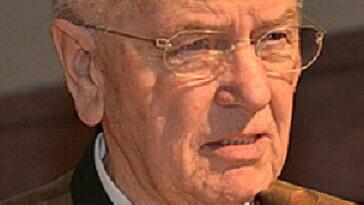He made a name for himself as the founder and director of the music secondary school as well as as a choir director, organist and composer. The renewal of the organ in the town parish church would probably not have come about without him.
Franz Tomschi was born in 1926 in Oberhaid, near the Austrian border in southern Bohemia. Even as a small child he played house music on the accordion – without notes, just by ear. He received piano lessons in elementary school and after the Marianum he went to grammar school. Tomschi enriched his teacher training with part-time studies at the Bruckner Conservatory. Even as a young teacher, he conducted several church choirs, choir communities and children’s choirs in secondary school. In addition, Franz Tomschi worked for two years at St. George’s College in Istanbul.
A year after he was appointed head of secondary school 2 in Freistadt in 1976, an amendment to the law permitted the founding of a music secondary school. Tomschi took advantage of this opportunity. A pioneering spirit was now required, since up to that point there had been neither documentation nor experience on how to run a secondary school for music. All the more Tomschi took the opportunity to design it himself and form a type of school that is still one of the figureheads in the educational landscape of the district. He was soon commissioned by the Linz State Theater to provide the “Three Boys” for “Magic Flute”.
Franz Tomschi also left music as a composer. In addition to choral literature, he wrote organ music. From various texts by several authors, he created three choral books, which he also published. Tomschi’s work contains more than 800 compositions in total. A great love was always the folk song: Its melodies are sung by many choirs.
Tomschi was an enthusiastic organist in the parish for 26 years. But with the organ itself – or rather: its poor technical condition – he often had a hard time. When this once again failed to function, the outraged organist called down from the gallery that it was impossible to play such an instrument. So he was represented with great commitment in the organ committee. In 2005 he was able to experience the blessing of the new instrument.
He ended his voluntary work as an organist in 2015 because he had trouble seeing the music clearly. He continued to play songs he knew inside out without sheet music. Just like he played and composed at home every day. For his decades of commitment as an organist, church musician and composer, Tomschi was awarded the Episcopal Coat of Arms Letter and the Golden Needle of Church Music in May 2018.

Source: Nachrichten




